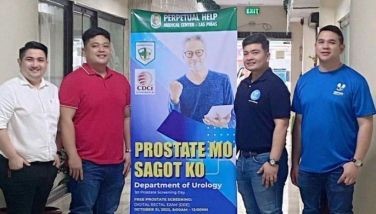SEAFDEC AQD develops new seaweed strain
May 25, 2003 | 12:00am
A new strain of seaweed has been developed.
The improved strain of Eucheuma denticulatum, developed by the Tigbauan, Iloilo-based Southeast Asian Fisheries Development Center Aquaculture Department (SEAFDEC AQD), grows fast and is highly resistant to common diseases affecting seaweeds.
Dr. Anne Hurtado, SEAFDEC AQD’s lead scientist in seaweed research, said the research was conducted for two years at the Igang Marine Station of SEAFDEC AQD in Guimaras.
The new strain was developed, first by dividing the callus (progagule) that grows in the thallus (body) of the seaweed into smaller tissue portions. Second, the tissues were cultured in the laboratory as regenerants. Third, the regenerants were transferred into net cages in the nearshores where they became seedstock for commercial cultivation by seaweed farmers.
Results of the test showed that the improved strain registered an impressive growth rate of 5.8 to 7.2 percent daily and is disease-free, during a four-month period.
What is more significant is the finding that the technology can be adapted to other species such as Kappahycus alvarezii and K. striatum, which are good sources of kappa carrageenan, Dr. Hurtado said.
The Philippines is at present the second top producer and the third leading world exporter of seaweeds, which in 2000 was valued at $130 million.
The country is also the major producer of Eucheuma and Kappaphycus as source of iota and kappa carrageenan, respectively. Carrageenan is an important raw material in the food, pharmaceutical and cosmetics industries.
"With the increasing demand for hydrocolloids (such as carrageenan) in the world market, technologies to increase production and improve the quality of seaweed products are important to maintain the industry’s global competitiveness," SEAFDEC AQD, headed by Dr. Rolando R. Platon, stressed.
Seaweed culture was introduced in the country in the early 1970s using the species K. alvarezii, K. straitum, and Eucheuma denticulatum.
The traditional use of cuttings as seedstock brought problems to the industry, such as deteriorating seedstock quality, unstable production, and vulnerability to "ice-ice" disease.
To address the problem of poor quality seedstock, SEAFDEC AQD, a regional treaty organization, started a seaweed research program aimed at producing fast-growing strains that are resistant to diseases.
SEAFDEC AQD collaborates with the Department of Agriculture-Bureau of Fisheries and Aquatic Resources (DA-BFAR) in the dissemination of AQD-developed technologies through the Joint Mission on Accelerated Nationwide Technology Transfer Program (JMANTTP). – Rudy A. Fernandez
The improved strain of Eucheuma denticulatum, developed by the Tigbauan, Iloilo-based Southeast Asian Fisheries Development Center Aquaculture Department (SEAFDEC AQD), grows fast and is highly resistant to common diseases affecting seaweeds.
Dr. Anne Hurtado, SEAFDEC AQD’s lead scientist in seaweed research, said the research was conducted for two years at the Igang Marine Station of SEAFDEC AQD in Guimaras.
The new strain was developed, first by dividing the callus (progagule) that grows in the thallus (body) of the seaweed into smaller tissue portions. Second, the tissues were cultured in the laboratory as regenerants. Third, the regenerants were transferred into net cages in the nearshores where they became seedstock for commercial cultivation by seaweed farmers.
Results of the test showed that the improved strain registered an impressive growth rate of 5.8 to 7.2 percent daily and is disease-free, during a four-month period.
What is more significant is the finding that the technology can be adapted to other species such as Kappahycus alvarezii and K. striatum, which are good sources of kappa carrageenan, Dr. Hurtado said.
The Philippines is at present the second top producer and the third leading world exporter of seaweeds, which in 2000 was valued at $130 million.
The country is also the major producer of Eucheuma and Kappaphycus as source of iota and kappa carrageenan, respectively. Carrageenan is an important raw material in the food, pharmaceutical and cosmetics industries.
"With the increasing demand for hydrocolloids (such as carrageenan) in the world market, technologies to increase production and improve the quality of seaweed products are important to maintain the industry’s global competitiveness," SEAFDEC AQD, headed by Dr. Rolando R. Platon, stressed.
Seaweed culture was introduced in the country in the early 1970s using the species K. alvarezii, K. straitum, and Eucheuma denticulatum.
The traditional use of cuttings as seedstock brought problems to the industry, such as deteriorating seedstock quality, unstable production, and vulnerability to "ice-ice" disease.
To address the problem of poor quality seedstock, SEAFDEC AQD, a regional treaty organization, started a seaweed research program aimed at producing fast-growing strains that are resistant to diseases.
SEAFDEC AQD collaborates with the Department of Agriculture-Bureau of Fisheries and Aquatic Resources (DA-BFAR) in the dissemination of AQD-developed technologies through the Joint Mission on Accelerated Nationwide Technology Transfer Program (JMANTTP). – Rudy A. Fernandez
BrandSpace Articles
<
>
- Latest
Latest
Latest
March 4, 2024 - 3:32pm
By Ian Laqui | March 4, 2024 - 3:32pm
March 4, 2024 - 2:12pm
By Kristine Daguno-Bersamina | March 4, 2024 - 2:12pm
February 13, 2024 - 7:24pm
By Gaea Katreena Cabico | February 13, 2024 - 7:24pm
February 13, 2024 - 7:17pm
By Ian Laqui | February 13, 2024 - 7:17pm
January 30, 2024 - 4:25pm
By Ian Laqui | January 30, 2024 - 4:25pm
Recommended



























